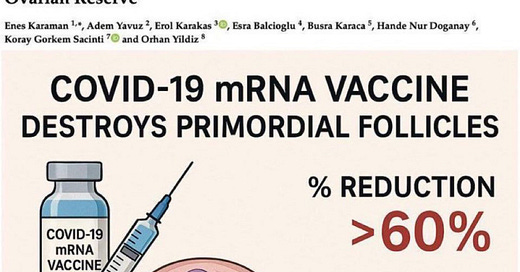I was able to read this in one of my online journal subscriptions, but it will not allow me to copy and paste the link as it is a “you gotta pay for it” journal. Below is a photo from Dr. McCullough about the study, and I will give a synopsis below the photo. Why is this important? Ovarian follicles are what become a mature follicle that release an egg during ovulation. Women are born with a finite amount of egg capability, and destruction of follicles can mean ovulation does not occur, ends earlier in life than it should, and by default, fertility issues.
Key Findings from the 2025 Study on Ovarian Reserve
- Thirty female rats (16–24 weeks old) were divided into three groups: control, mRNA vaccine, and inactivated vaccine.
- Each vaccine group received two doses (human-equivalent) on days 0 and 28.
- Ovarian tissues were analyzed four weeks after the second dose using histological and immunohistochemical methods to assess transforming growth factor beta-1 (TGF-β1), vascular endothelial growth factor (VEGF), caspase-3, and anti-Müllerian hormone (AMH) expression.
Results:
- Follicle Counts: Both vaccines significantly reduced primordial, primary, and secondary follicle counts compared to controls, with the mRNA vaccine group showing a greater reduction than the inactivated vaccine group (p < 0.001). The mRNA group also had fewer antral and preovulatory follicles and more atretic (degenerating) follicles (p < 0.05).
- Hormonal Markers: AMH expression in granulosa cells of primary, secondary, and antral follicles was significantly reduced in both vaccine groups (p < 0.001), with serum AMH levels notably lower in the mRNA group compared to control and inactivated groups.
- Apoptotic Pathways: Both vaccines increased TGF-β1, VEGF, and caspase-3 expression, indicating accelerated follicular loss and altered apoptosis, with more pronounced effects in the mRNA group.
- Conclusion: The study suggests that both mRNA and inactivated COVID-19 vaccines may detrimentally impact ovarian reserve in rats, primarily through accelerated follicular loss and changes in apoptotic pathways. The mRNA vaccine appeared to have a more significant effect than the inactivated vaccine.
Limitations
- The study is preclinical (rat model), so direct applicability to humans is uncertain.
- It focused on short-term effects and did not assess long-term fertility outcomes or offspring health.




Further expresses the idea that mRNA poisons were pushed on all humans for demonic purposes.
Excellent find. Thanks for sharing. I have also seen 1 peer reviewed study from sperm bank data documenting significant reduction in sperm quality parameters after jab 1 and again after jab 2. In Scandinavian literature. Recovered with time.
Depopulation.